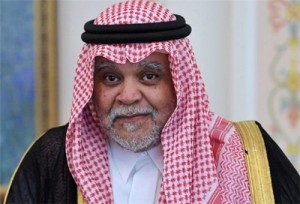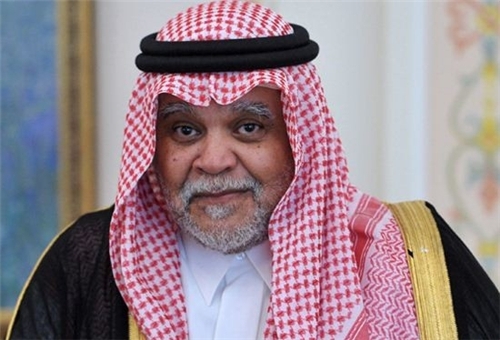 TEHRAN (FNA)- During his recent visit to Moscow some weeks ago, Saudi intelligence chief Bandar bin Sultan told Russian President Vladimir Putin that Saudi-controlled militants in the Caucasus will not disrupt the Winter Olympic Games in Sochi only if Russia backed away from its support for Syria, and Putin rejected the proposal furiously, reports said.
TEHRAN (FNA)- During his recent visit to Moscow some weeks ago, Saudi intelligence chief Bandar bin Sultan told Russian President Vladimir Putin that Saudi-controlled militants in the Caucasus will not disrupt the Winter Olympic Games in Sochi only if Russia backed away from its support for Syria, and Putin rejected the proposal furiously, reports said.�We know that you have supported the Chechen terrorist groups for a decade. And that support, which you have frankly talked about just now, is completely incompatible with the common objectives of fighting global terrorism that you mentioned�, Putin is said to have answered according to Syria news.
There are good reasons for Bandar and the Saudi ruling family to be angry at Russia (and lately at the US, too). Saudi Arabia�s plans against Shiites and the Axis of Resistance in the Middle East have been undermined by Russian policies in Syria, Iran and elsewhere. Bandar planned to overthrow Bashar al Assad in Syria through a US attack and the action of terrorist groups there, to isolate and destroy Hezbollah and to push Washington into a confrontation with Tehran.
However, Bandar clearly misunderstood Russia, Iran and Hezbollah and their determination to support their Syrian ally and to defeat his plans. Russia deployed a powerful fleet in Eastern Mediterranean and made it clear that it was willing to support and protect Syria.
Therefore, Bandar could try to take revenge on Russia through his terrorist tools. This is of course insane, but his threats to Russia (and now to the US) are themselves evidence of his insanity and stupidity and led the world public opinion to understand that the Saudi regime itself is a real problem for the region and the world.
Extremist groups and the Olympic Games
Terrorist groups tied to Saudi Arabia and other countries have been operating in the North Caucasus for years. According to Syria's Grand Mufti Sheikh Ahmad Badreddin Hassoun, who recently visited the Islamic University of Moscow, �there are around 2,000 extremists from Russia fighting in Syria.� He said that �among the fighters, there are people from Chechnya and Dagestan in the Caucasus as well as those of Tatarstan in central Russia�.
According to the Lebanese daily As Safir, which quoted the director of the Russian site Qafqaz Ozil, Gregory Chavidov, �the Russian extremists have gained experience in the war in Syria. They have learned to fight in cities. Up to now, the terrorists in the Caucasus did not enjoy such experience. And when they return home and organize their ranks, they will certainly represent a major threat.� He added that �Sochi is seriously exposed to attacks by extremist groups who took part in street battles in Syria, in spite of all measures taken to ensure security for the Olympic Winter Games.�
The ringleader of the terrorists in the Russian Caucasus Doku Umarov threatened last July to disrupt the Olympic Winter Games, promising that he would try by all means to prevent the games from taking place. Umarov has reached a deal with Emir Salautdin, who controls North Caucasus militants in Syria, for those militants to return to Russia to fight under his command. Umarov has proclaimed the North Caucasus an independent state, calling it Imarat Kaukaz (The Caucasus Emirate). The Russian expert said that �if the Russian militants return to the country, responding to Umarov�s call, it would represent a serious concern.�
For his part, Russian President Vladimir Putin has expressed concern over the return of Russian militants who are currently fighting against Syrian forces. He wrote in a recent article published in the New York Times, �We cannot but be concerned about the presence of hundreds of extremists from Western countries and even Russia, who are fighting Syria. Who can assure us that these people, with their experience in Syria, will not come back to our country? This is a real threat to us all.�
The Russian President called on the country's Muslim leaders to work together with state authorities in order to counter these radical movements. �Radical movements, which have never been popular among Russian Muslims seek to weaken our state and to create foreign-managed conflicts in the Russian territory,� he said.
Putin has set up a clear policy, which aims at combating extremist groups wherever it is possible and necessary, with no concerns for other factors. The current civil war in Syria is considered by the Russian president a continuation of his fight in Chechnya and this is a message easily understandable by the majority of Russians.
Putin has ordered Russian intelligence agencies to step up their efforts in Northern Caucasus and has issued a decree reducing the freedom of movement and assembly near the Sochi resort. �Despite the obvious positive changes, the situation in the North Caucasus is improving too slowly,� Putin said. �Terrorist threats, uncertainties regarding safety have not been permanently eradicated."
The Russian concern has been fuelled by the terrorist attack on October 22 in Volvograd. Six people were killed and 37 were injured - some of them critically - after a female suicide bomber, Naida Asivalova, from Dagestan, set off a bomb on a bus in Volgograd, Central Russia.
Recently, a Russian citizen, Sergei Gorbunov, was also captured by �extremist militants� in Syria, who threatened to �slaughter� him if Russia and Syria did not exchange him through the Red Cross for a native of Saudi Arabia named Khaled Suleiman. He was reportedly taken hostage by militants from the Jaish al-Muhajireen wal-Ansar (Army of Emigrants and Supporters). This group is led by Abu Omar al Chechen and is manned by volunteers from the Caucasus.
On the other hand, Bandar�s claims that Saudi Arabia controls Chechen terrorist groups has also raised new questions about the April 15 Boston Marathon bombing. The Tsarnaev brothers, who allegedly carried out the attacks, had close family links to Chechen extremist groups in Russia. The elder brother, Tamerlan, traveled to the region to contact such groups.
Threats from Afghanistan
The Caucasus is not the only region where extremist groups are acting against Russia. While NATO forces are preparing the pull-out of their troops from Afghanistan, Moscow is increasingly concerned that this fact will increase the threat for Russia and its allies in Central Asia. It already happened in the 1980s, when the CIA and Bandar supported �Mujahideen� who were fighting against Soviet troops in Afghanistan as a part of a more comprehensive plan to spread the extremist ideology within the boundaries of the Soviet Union and thus create problems and weaken the latter.
Russia recently announced that it would reinforce its military contingents in Tajikistan and Kyrgyzstan ahead of the US withdrawal. The head of Russian GRU military intelligence agency, Igor Sergun, said that the current situation in Afghanistan was �a serious challenge to international stability�.
Russia maintains some big military bases in Central Asia and around 7,000 Russian soldiers are deployed there. Seven hundred soldiers are stationed in Kyrgyzstan, especially in the Kant air base near the capital, Bishkek. In Tajikistan, Russian land forces of the 201st Motorized Rifle Division have their own base and both countries have started negotiations on the use of the Ayni air base by Russian military, too. However, Russian experts consider that the existing network of Russian bases is not sufficient to protect Tajikistan's long border with Afghanistan in the case of a conflict.
The governments of Tajikistan and Uzbekistan have been fighting against the Islamic Movement of Uzbekistan (IMU), which is supported by the Taliban. After suffering heavy losses in the Afghan war, the IMU's activities are now limited to the South of Tajikistan, although there are also reports pointing to the presence of this group in other Central Asian republics.
By Fars News Agency
The Iran Project is not responsible for the content of quoted articles.











